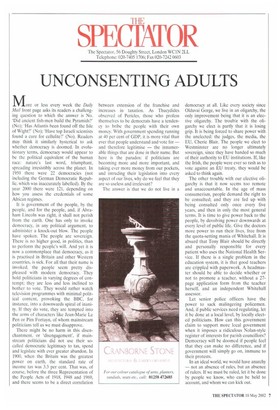UNCONSENTING ADULTS
More or less every week the Daily Mail front page asks its readers a challenging question to which the answer is No. 'Did ancient fish-men build the Pyramids?' (No); Has Atlantis been found off the Isle of Wight?' (No); 'Have top Israeli scientists found a cure for cellulite? (No). Readers may think it similarly hysterical to ask whether democracy is doomed. In evolutionary terms, democracy would appear to be the political equivalent of the human race: nature's last word, triumphant, spreading irresistibly across the planet. In 1950 there were 22 democracies (not including the German Democratic Republic, which was inaccurately labelled). By the year 2000 there were 121, depending on how you assess the credentials of some African regimes.
It is government of the people, by the people, and for the people, and, if Abraham Lincoln was right, it shall not perish from the earth. One has only to invoke democracy, in any political argument, to administer a knock-out blow. The people have spoken. The people are sovereign. There is no higher good, in politics, than to perform the people's will. And yet it is now a commonplace that democracy, as it is practised in Britain and other Western countries, is sick. For all that their name is invoked, the people seem pretty displeased with modern democracy. They hold politicians in varying degrees of contempt; they are less and less inclined to bother to vote. They would rather watch television programmes with minimal political content, provoking the BBC, for instance, into a downwards spiral of inanity. If they do vote, they are tempted into the arms of characters like Jean-Marie Le Pen or Pim Fortuyn, of whom mainstream politicians tell us we must disapprove.
There might be no harm in this disenchantment. or 'disengagement', if mainstream politicians did not use their socalled democratic legitimacy to tax, spend and legislate with ever greater abandon. In 1900, when the Britain was the greatest power on earth, the standard rate of income tax was 3.3 per cent. That was, of course, before the three Representation of the People Acts of 1918, 1948 and 1969, and there seems to be a direct correlation between extension of the franchise and increases in taxation. As Thucydides observed of Pericles, those who profess themselves to be democrats have a tendency to bribe the people with their own money. With government spending running at 40 per cent of GDP, it is more vital than ever that people understand and vote for — and therefore legitimise — the innumerable things that are done in their name. But here is the paradox: if politicians are becoming more and more important, and taking ever more money from our pockets, and intruding their legislation into every aspect of our lives, why do we feel that they are so useless and irrelevant?
The answer is that we do not live in a democracy at all. Like every society since Olduvai Gorge, we live in an oligarchy, the only improvement being that it is an elective oligarchy. The trouble with the oligarchy we elect is partly that it is losing grip. It is being forced to share power with the unelected: the judges, the media, the EU, Cherie Blair. The people we elect to Westminster are no longer ultimately sovereign, since they have handed so much of their authority to EU institutions. If, like the Irish, the people were ever so rash as to vote against an EU treaty, they would be asked to think again.
The other trouble with our elective oligarchy is that it now seems too remote and unaccountable. In the age of mass consumerism, people demand the right to be consulted; and they are fed up with being consulted only once every five years, and then in only the most general terms. It is time to give power back to the people, by devolving power downwards at every level of public life. Give the doctors more power to run their lives, free from the quota-setting mania of Whitehall. It is absurd that Tony Blair should be directly and personally responsible for every patient who uses the National Health Service. If there is a single problem in the education system, it is that good teachers are crippled with paperwork. A headmaster should be able to decide whether or not to promote a teacher, without a 27page application form from the teacher herself, and an independent Whitehall assessor.
Let senior police officers have the power to sack malingering policemen. And, if public services need regulating, let it be done at a local level, by locally elected politicians. How can this government claim to support more local government when it imposes a ridiculous Nolan-style register of interests for parish councillors? Democracy will be doomed if people feel that they can make no difference, and if government will simply go on, immune to their protests.
In an ideal world, we would have anarchy — not an absence of rules, but an absence of rulers. If we must be ruled, let it be done by people we know, who can be held to account, and whom we can kick out.














































































 Previous page
Previous page